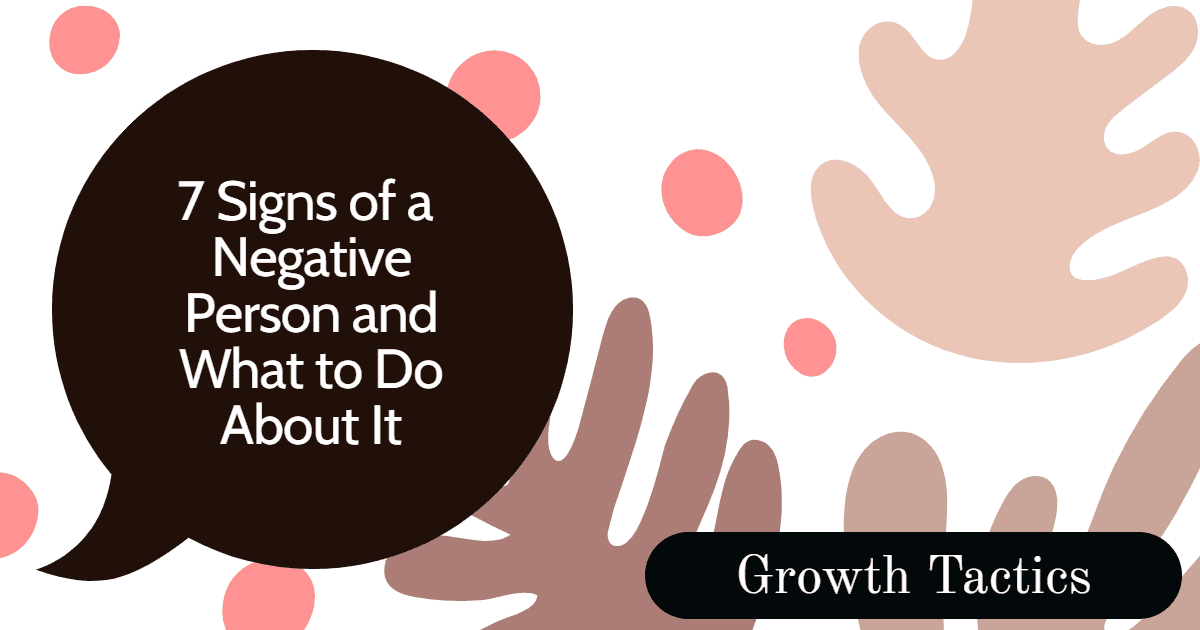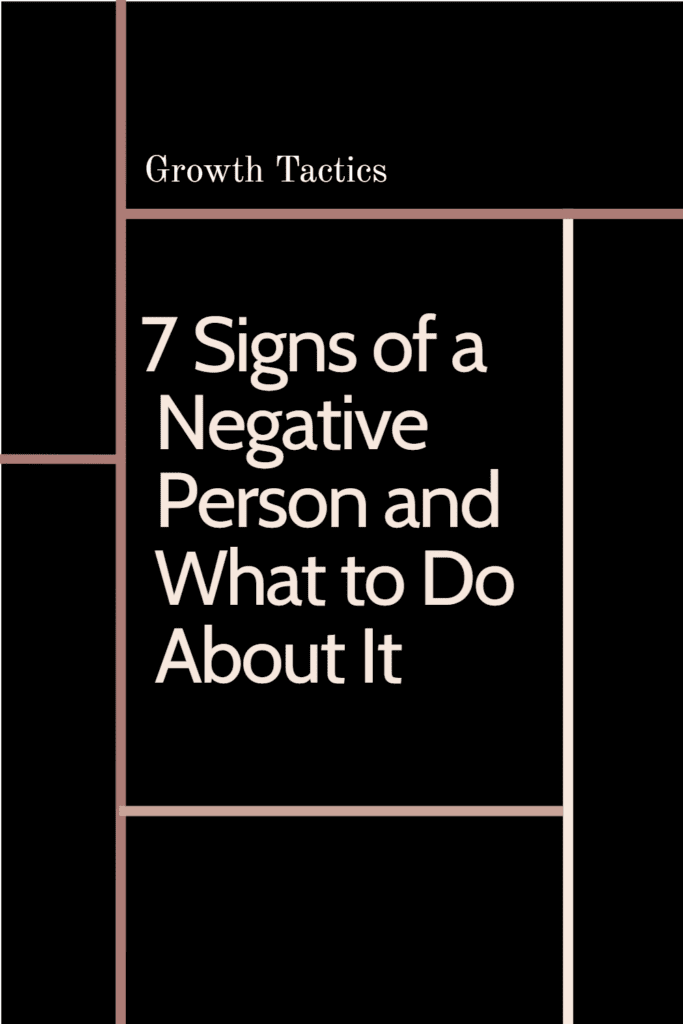Hey there, my fellow motivated souls! Today, I want to tackle a topic that’s near and dear to my heart. The 7 signs of a negative person and, more importantly, what we can do about it. You see, in our journey toward personal growth and success, we often encounter individuals who drain our energy and bring us down.
But fear not, my friends, because with these 7 telltale signs, you’ll be able to spot negativity a mile away and take the necessary steps to rise above it. So, let’s dive in and uncover how to protect our positive mindset from the clutches of negativity! Get ready to transform your relationships and create a fulfilling life like never before.
Understanding Negative People
Negative people are individuals who consistently exhibit pessimistic attitudes, emotions, and behaviors. They often focus on the unfavorable aspects of life and tend to bring down the morale and energy of those around them. Understanding the characteristics and impact of negative people is crucial for maintaining personal well-being and fostering healthy relationships.

What are negative people?
Negative people can be identified through various signs and behaviors. It is essential to recognize these signs to protect ourselves from their detrimental effects. Here are the 7 common signs of a negative person:
- Complaining excessively
- Always seeing the worst
- Energy drainers
- Never taking responsibility
- Spreading negativity
- Opposition to change
- Lack of self-awareness
We will discuss each of these in more detail later.
The impact of negative people
Being consistently exposed to negative people can have various detrimental effects on our well-being. The negativity they emit can seep into our lives and affect us emotionally, mentally, and even physically. Some common impacts include:
- Emotional drain: Interacting with negative people can leave us feeling emotionally exhausted, drained, and overwhelmed.
- Reduced self-esteem: Negativity can undermine our confidence and self-worth, making us doubt our abilities and achievements.
- Hindered growth: Negative people tend to discourage personal growth and inhibit progress by promoting fear, doubt, and insecurity.
- Toxic relationships: Prolonged exposure to negative individuals can lead to toxic relationships, eroding trust, understanding, and healthy communication.
Why negative people rarely change
It is important to remember that negative people rarely change overnight or without significant effort. Some reasons negative individuals struggle to change include:
- Comfort Zone: Negative behavior may provide a sense of familiarity and comfort, making it difficult for individuals to break out of their negative patterns.
- Mental conditioning: Years of conditioning and reinforcement of negative thinking can make it challenging for individuals to adopt a more positive mindset.
- Resistance to self-reflection: Negative people often lack self-awareness or avoid reflecting on their behaviors, inhibiting their ability to recognize the need for change.

7 Signs of Negative People
Negative people can be easily identified through their behaviors and attitudes. By recognizing these signs, we can better understand and navigate our interactions with them. Here are seven key signs of negative people:
1. Excessive complaining
Negative individuals have a knack for complaining excessively about anything and everything. They often focus on the negative aspects of their lives without seeking solutions or taking action to improve their circumstances.
2. Always seeing the worst
Negative people have a pessimistic outlook on life and tend to see the worst in every situation. They have a distorted perception that magnifies the negative aspects of situations, people, and even themselves.
3. Energy drainers
Negative people drain the energy of those around them, leaving others feeling exhausted, emotionally drained, and disheartened. Their constant negativity can be emotionally taxing and impact our overall well-being.
4. Lack of responsibility
Negative individuals rarely take responsibility for their actions. Instead, they consistently blame others or external factors for their problems and failures. This lack of accountability can be frustrating and prevent any personal growth or resolution.
5. Spreading negativity
Negative people are known for spreading their negativity to those they interact with. Their pessimistic mindset and constant complaints can influence the moods and mindsets of others, creating an atmosphere of negativity.
6. Opposition to change
Negative individuals often resist change and find comfort in their familiar routines and habits. Stepping out of their comfort zone is a challenge, and they may discourage or hinder any attempts at personal or professional growth.
7. Lack of self-awareness
Negative people may lack self-awareness or refuse to acknowledge their negative behavior. This makes it difficult for them to recognize how their attitudes and actions impact themselves and those around them.
By being aware of these signs, we can better identify negative people and take appropriate measures to protect our well-being and maintain positive relationships. Remember, it’s important to set boundaries and surround ourselves with positivity to cultivate a healthier and happier environment.

How to Deal with a Negative Person
Negativity can be contagious and can have a draining effect on our own well-being. However, we can learn how to deal with negative people in a way that minimizes their impact on us. Here are some strategies you can use:
1. Maintain Boundaries
Setting boundaries is crucial when dealing with negative people. It’s important to establish what you are comfortable with and communicate that clearly. If someone consistently brings negativity into your life, consider limiting your interactions with them or creating a safe distance.
2. Practice Active Listening
When engaging with negative individuals, practice active listening. Pay attention to what they are saying and try to understand their perspective. Reflecting on their concerns or feelings shows that you are listening, which can help diffuse tension and create a more positive environment.
3. Reframe the Conversation
Instead of getting caught up in negativity, try reframing the conversation towards more constructive topics. Gently steer the discussion towards something positive or find a problem-solving approach to address any concerns. Redirecting the conversation can help shift the focus away from negativity.
4. Maintain a Positive Attitude
It’s important to maintain a positive attitude when dealing with negative people. Remind yourself of your own values and beliefs, and don’t let their negativity bring you down. Focus on solutions rather than dwelling on the negativity that may surround them.
5. Surround Yourself with Positivity
Surrounding yourself with positive influences can offset the impact of negative people. Seek out supportive friends, engage in activities that bring you joy, and fill your life with positive energy. Having a strong support system can help you navigate challenging interactions with negative individuals.
6. Practice Self-Care
Taking care of yourself is essential when dealing with negative people. Engage in activities that recharge and nurture you, such as exercise, hobbies, or spending time in nature. Prioritize self-care to ensure your own well-being is protected.
Remember, dealing with negative people is a skill that takes time to develop. By maintaining boundaries, practicing active listening, reframing conversations, maintaining a positive attitude, surrounding yourself with positivity, and practicing self-care, you can effectively handle negative individuals while prioritizing your well-being.

How to Avoid Becoming a Negative Person
Negativity can easily seep into our lives if we’re not careful. However, there are steps we can take to prevent ourselves from becoming negative individuals. Here are six strategies to help you avoid becoming a negative person:
1. Practice self-awareness
Self-awareness is key in identifying negative patterns and tendencies within ourselves. Take the time to reflect on your thoughts, emotions, and reactions. Notice when negativity starts to creep in and make a conscious effort to redirect your focus towards more positive and constructive thoughts.
2. Surround yourself with positivity
The people we surround ourselves with can have a significant impact on our mindset. Choose to be around positive, supportive, and uplifting individuals who bring out the best in you. Their positive energy will help counteract any potential negativity in your life.
3. Foster a positive mindset
Developing a positive mindset takes effort and practice. Challenge negative thoughts and replace them with positive affirmations. Practice gratitude by regularly expressing appreciation for the good things in your life. Engage in activities that bring you joy and fulfillment. By consciously cultivating positivity, you can avoid falling into the trap of negativity.
4. Take care of your physical well-being
Our physical health plays a significant role in our overall well-being. Ensure you get enough sleep, eat a balanced diet, and exercise regularly. When our bodies are healthy, it’s easier to maintain a positive mindset and avoid negative thoughts and emotions.
5. Practice mindfulness and stress management
Mindfulness techniques, such as meditation or deep breathing exercises, can help reduce stress and negative thinking. Incorporate mindfulness practices into your daily routine to stay grounded and centered. Find healthy and constructive ways to manage stress, such as engaging in hobbies, practicing relaxation techniques, or seeking support from loved ones.
6. Seek professional help if needed
If you find yourself consistently struggling with negativity and it starts interfering with your daily life, it may be helpful to seek professional help. A therapist or counselor can provide guidance and support in managing negative emotions and developing healthier coping mechanisms.
In Conclusion
Remember, avoiding negativity is a continuous process. By practicing self-awareness, surrounding yourself with positivity, fostering a positive mindset, taking care of your physical well-being, practicing mindfulness and stress management, and seeking professional help if needed, you can prevent yourself from becoming a negative person. Choose to focus on the good in life and embrace positivity on your journey toward personal growth and happiness.


